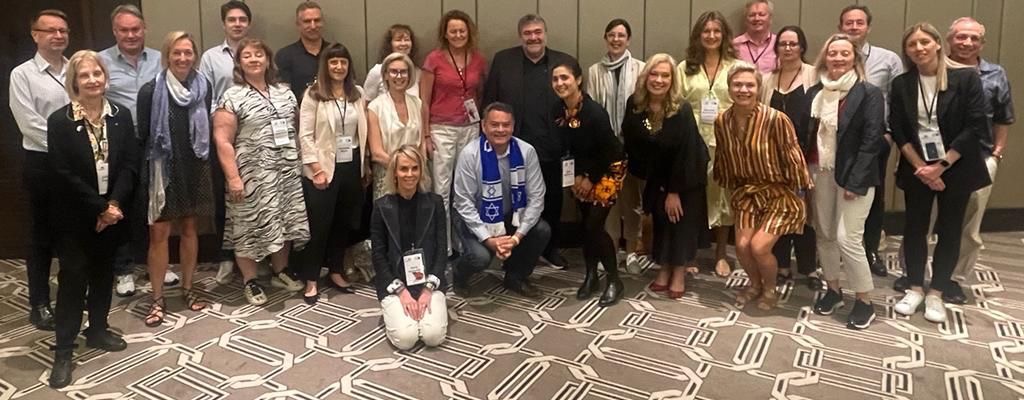I recently had the privilege of being accepted into the Australia Israel Chamber of Commerce and joint AMCHAM trade mission to Israel. This study tour had a leading edge Technology focus and was led by two incredible Australian leaders, Jillian Segal and Robyn Denholm. I was joined by 23 inspiring and interesting business leaders ranging from NEDs to CEOs, educators and Technology experts. I wanted to grow professionally and be able to bring new thinking and new curiosity and knowledge to my role as a board director.
During a jam packed week, I observed the differences between Israel and Australia, the reasons that underpin a system dedicated to growth and innovative practices, driving deep tech and focused on solving global challenges.
I saw the difference between a parochial and territorial system such as ours, and learned what was possible when an ecosystem of business, academia and government all worked together (imagine that!), to support technological growth, to inclusively better the future of the world’s communities, as well as drive growth and financial outcomes for new businesses, and all from a nation that is roughly 1/3 the size of Tasmania.
Irrespective of any prejudices the media has embedded, the intelligence of people so driven to change the future is admirable and on some levels, shameful for us.
You have to appreciate the overarching context, instilled from cultural and historical journeys, of a mindset of positivity and optimism, know that it’s peppered with tragedy, sadness, fear and survival necessity, to fully comprehend the scale of what the start up nation, now more appropriately called the scale up nation is achieving.
There was a constant theme of “can do”. There is a lens of taking a risk offensive vs being on the defensive. There is a culture so deeply rooted in their fabric and so much of which Australia could adopt if we could only shift our mindset, enabling inclusivity of ideas and diversity of thinking and opinion, instead of our “nanny State” mentality. We should be involving all aspects of the community for the betterment of business and the Australian economy.
To do this, we must have a government who actively support the innovation agenda, who have a more relevant view of speed and a desire to breakdown bureaucracy and red tape, and open the door wide to ideas and new thinking, putting their money where there mouth is. It also requires a long term focus, rather than one that hops from election to election.
Enlightenment for me was in a widespread belief that innovation and peace go hand in hand. What a fantastic perspective and so right, when you consider it.
One delivers the other and Israelis truly desire this. The desire to work with everyone and anyone on issues of global importance with the right partners to enable accessibility and reach, driven out of a small place, many of which similarities exist for us. We are small, in numbers. We are relatively isolated. We have the challenge of distance and costs to navigate. We feel ‘safe’ however we surely know that nobody is ever truly ‘safe’ in today’s world.
Above all else, however, we have a short term mentality. In Israel have a longer term vision, not dissimilar to some of our Asia counterparts who have patience and strategic foresight driving their global expansion.
There were so many amazing presentations and projects. One of my favourite phrases, and my newly adopted mantra is that “there are no prophets, only possibilities and percentages”.(Major General Amos Yadlin). The optimism inherent in this and the way it makes you think is differently.
The other phrase, of so many, that resonated for me is that we must work on “shaping the future, not obsess and try to predict it” from Sagie Davidovitch, Co-Founder and CEO of SparkBeyond which is developing a problem-solving platform which harnesses humanity’s collective intelligence to generate millions of ideas in minutes and empowers organizations with strategic and operational intelligence for maximum impact.
We heard about companies building around Ai in mobility, the electrification and digitisation of EV’s and clime-tech where a successful climate tech start up often seemed to be a marriage between business and science and science often stems out of academic research. We heard about Agri-tech, land management, resourcing and beyond. Health and education were thematics of some of the businesses. Creating options that enabled a diverse and futuristic workforce built from a workplace change mentality was another theme.
There were businesses focussed on using analytics to shape the future for society’s sustainability and generational good. We witnessed and experienced companies scaling up in the areas of de-carbonisation, seeking to build out and win in the energy race to efficiency and accessibility and understanding (while debunking the myths and developing practices, ensuring outcomes that are attainable and understandable for the “common man”).
We saw and heard about deep tech solutions around Cyber security at whole new levels. We saw the impact of an Army system which enabled a mindset of accountability and responsibility from the young, and particularly the role of those young adults from the elite Unit 8200 with a deep tech focus and true STEM initiatives.
The thesis that it is ultimately all about protecting the Identity of people was central to the development of protective programmes of work, recognising that the rest is collateral in any criminal process. Pulling cyber apart to this level and focusing on the ID component as the central piece had clarity of purpose and a simplicity that meant these companies were building with the human component front and centre. One presentation was from Authomize, and Gal Diskin, which is a Cloud identity and threat response company, protecting the ID, the identity layer.
They have commercialised since 2021, used by companies to control the access layers around identity. They have been backed by by Microsoft’s M12 innovation arm and others.
We spend a lot of time in companies here on the ‘architecture’ of security, and sometimes miss the point that in the end it’s all about the humans.
These are just the tip of the iceberg in terms of my learning, but overall what did I take away to do as a Director?
- Keep pushing the long term “investment” lens vs the short term. As directors, we have some work to do here with shareholders and investors vs short term returns pressure, but as Remuneration Chair I have responsibility to ensure the long term sustainability focus is there, ensuring the social and humanity conscience.
- Widen the conversation around risk considerations, remaining pragmatic and within the Corporations Act, but pushing colleagues to open our minds more to possibilities, and reconsider our risk appetite accordingly.
- Consider growth partners who enable outreach that you don’t have, if wanting to scale faster.
- Role of culture, which was reinforced over and over- Govt won’t change the culture in Australia, many have done trade missions but the common catch cry appears to be “it’s amazing but we would never be able to do that in Australia”. I ask, why not? It does mean Business will need to drive this component harder than ever.
- Changed the paradigm of my questioning around M&A which comes to the board and it will definitely enable me to think from a different perspective around this now, ask different questions and consider different possibilities.
In the end I wish this statement could switch out the word “Israeli” for Australian…
“We connect global needs with Israeli technology solutions”.

